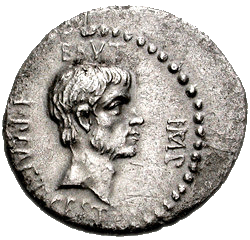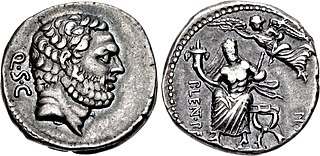Related Research Articles

Marcus Junius Brutus was a Roman politician, orator, and the most famous of the assassins of Julius Caesar. After being adopted by a relative, he used the name Quintus Servilius Caepio Brutus, which was retained as his legal name. He is often referred to simply as Brutus.
Publius Clodius Pulcher was a populist Roman politician and street agitator during the time of the First Triumvirate. One of the most colourful personalities of his era, Clodius was descended from the aristocratic Claudia gens, one of Rome's oldest and noblest patrician families, but he contrived to be adopted by an obscure plebeian, so that he could be elected tribune of the plebs. During his term of office, he pushed through an ambitious legislative program, including a grain dole; but he is chiefly remembered for his long-running feuds with political opponents, particularly Cicero, whose writings offer antagonistic, detailed accounts and allegations concerning Clodius' political activities and scandalous lifestyle. Clodius was tried for the capital offence of sacrilege, following his intrusion on the women-only rites of the goddess Bona Dea, purportedly with the intention of seducing Caesar's wife Pompeia; his feud with Cicero led to Cicero's temporary exile; his feud with Milo ended in his own death at the hands of Milo's bodyguards.

The gens Claudia, sometimes written Clodia, was one of the most prominent patrician houses at ancient Rome. The gens traced its origin to the earliest days of the Roman Republic. The first of the Claudii to obtain the consulship was Appius Claudius Sabinus Regillensis, in 495 BC, and from that time its members frequently held the highest offices of the state, both under the Republic and in imperial times.

Quintus Fufius Calenus was a Roman Republican politician and general. When Fufius was plebeian tribune in 61 BC he was an ally of Publius Clodius Pulcher during the Bona Dea affair. During his praetorship in 59 BC he supported Julius Caesar who was then consul. Fufius later served under Caesar at the close of the Gallic Wars and during the civil war that followed. For his services he was made consul in 47 BC. After Caesar's death in 44 BC, he supported Mark Antony against Cicero during the ensuing conflict in the senate. As an ally of Antony governing Cisalpine Gaul, he died of illness in 40 BC on the cusp of intervening in the Perusine War.

Publius Cornelius Lentulus Spinther was a Roman politician and general. Hailing from the patrician family of the Cornelii, he helped suppress the Catilinarian conspiracy during his term as curule aedile in 63 BC and later served as consul in 57 BC. Denied the opportunity to invade Egypt the following year, he nevertheless won some victories in his province of Cilicia and celebrated a triumph over it in 51 BC.
Gaius Trebonius was a military commander and politician of the late Roman Republic, who became suffect consul in 45 BC. He was an associate of Julius Caesar, having served as his legate and having fought on his side during the civil war, and was among the tyrannicides who killed the dictator.
Lucius Marcius Philippus was a politician and senator in the late Roman republic. He was governor of Syria from 61 to 60 and later served in the consulship of 56 BC. He was also step-father of the emperor Augustus.
Publius Vatinius was a Roman politician during the last decades of the Republic. He served as a Caesarian-allied plebeian tribune in the year 59 – he was the tribune that proposed the law giving Caesar his Gallic command – and later fought on that side of the civil war. Caesar made him consul in 47 BC; he later fought in Illyricum for the Caesarians and celebrated a triumph for his victories there in 42 BC.
Marcus Aemilius Scaurus was a Roman politician of the 1st century BC and son of Marcus Aemilius Scaurus and Caecilia Metella.
Lucius Domitius Ahenobarbus, consul in 54 BC, was an enemy of Julius Caesar and a strong supporter of the aristocratic party in the late Roman Republic.
Lucius Volcatius Tullus was a Roman politician who became consul in 66 BC alongside Manius Aemilius Lepidus.
The gens Terentia was a plebeian family at ancient Rome. Dionysius mentions a Gaius Terentius Arsa, tribune of the plebs in 462 BC, but Livy calls him Terentilius, and from inscriptions this would seem to be a separate gens. No other Terentii appear in history until the time of the Second Punic War. Gaius Terentius Varro, one of the Roman commanders at the Battle of Cannae in 216 BC, was the first to hold the consulship. Members of this family are found as late as the third century AD.
Quintus Caecilius Metellus Nepos was an ancient Roman politician during the Late Republic. He was a son of Quintus Caecilius Metellus Nepos and served as tribune of the plebs in 62 BC, consul in 57 BC, and the governor of Hispania Citerior from 56–55 BC.

The gens Sestia was a minor patrician family at ancient Rome. The only member of this gens to obtain the consulship in the time of the Republic was Publius Sestius Capitolinus Vaticanus, in 452 BC.

Lucius Manlius Torquatus was a Roman politician and military commander. He was active during the Crisis of the Roman Republic and Caesar's Civil War. He commanded troops at the battles of Oricum, Dyrrhachium and Thapsus. The last of these ended the war, in a defeat for the faction Torquatus supported; he escaped the field, but was captured and killed shortly after. He is portrayed by Cicero in De Finibus as a spokesman advocating Epicurean ethics.
The gens Cornificia was a plebeian family at Rome. No persons of this name occur until the last century of the Republic; and the first who obtained any of the higher honours of the state was Quintus Cornificius, praetor in 66 BC.
Marcus Licinius Crassus was a quaestor of the Roman Republic in 54 BC. He was the elder son of the Marcus Licinius Crassus who formed the political alliance known as the "First Triumvirate" with Pompey and Caesar. His mother was Tertulla, the daughter of Marcus Varro Lucullus. His father and his younger brother, Publius, died at the Battle of Carrhae in 53 BC, after which time Marcus continued to be a partisan of Caesar.
The gens Rutilia was a plebeian family at ancient Rome. Members of this gens appear in history beginning in the second century BC. The first to obtain the consulship was Publius Rutilius Rufus in 105 BC.
The gens Trebonia, rarely Terebonia, was a plebeian family at ancient Rome. Members of this gens are mentioned in the first century of the Republic, and regularly throughout Roman history, but none of them attained the consulship until the time of Caesar.
The gens Trebellia, occasionally written Trebelia, was a plebeian family at ancient Rome. Members of this gens are first mentioned at the time of the Second Punic War, but they played little role in the Roman state until the final decades of the Republic. Trebellii are known from inscriptions in Delos and in Athens between 150 and 89 BC. The most illustrious of the Trebellii was Marcus Trebellius Maximus, who attained the consulship in AD 55.
References
- ↑ Broughton 1952, pp. 165–68.
- 1 2 Broughton 1952, p. 202.
- ↑ Broughton 1952, p. 620.
- ↑ Broughton 1952, p. 222.
- ↑ Broughton 1952, p. 264.
- ↑ Tempest, Kathryn (2017). Brutus : the noble conspirator. New Haven. p. 61. ISBN 978-0-300-18009-1. OCLC 982651923.
{{cite book}}: CS1 maint: location missing publisher (link) - ↑ Broughton 1952, p. 278.
- ↑ Smith, William (1876). "A Dictionary of Greek and Roman Biography and Mythology: Oarses-Zygia".
Sources
- Broughton, Thomas Robert Shannon (1952). The magistrates of the Roman republic. Vol. 2. New York: American Philological Association.
 This article incorporates text from a publication now in the public domain : Smith, William, ed. (1870). "Publius Sestius". Dictionary of Greek and Roman Biography and Mythology .
This article incorporates text from a publication now in the public domain : Smith, William, ed. (1870). "Publius Sestius". Dictionary of Greek and Roman Biography and Mythology .